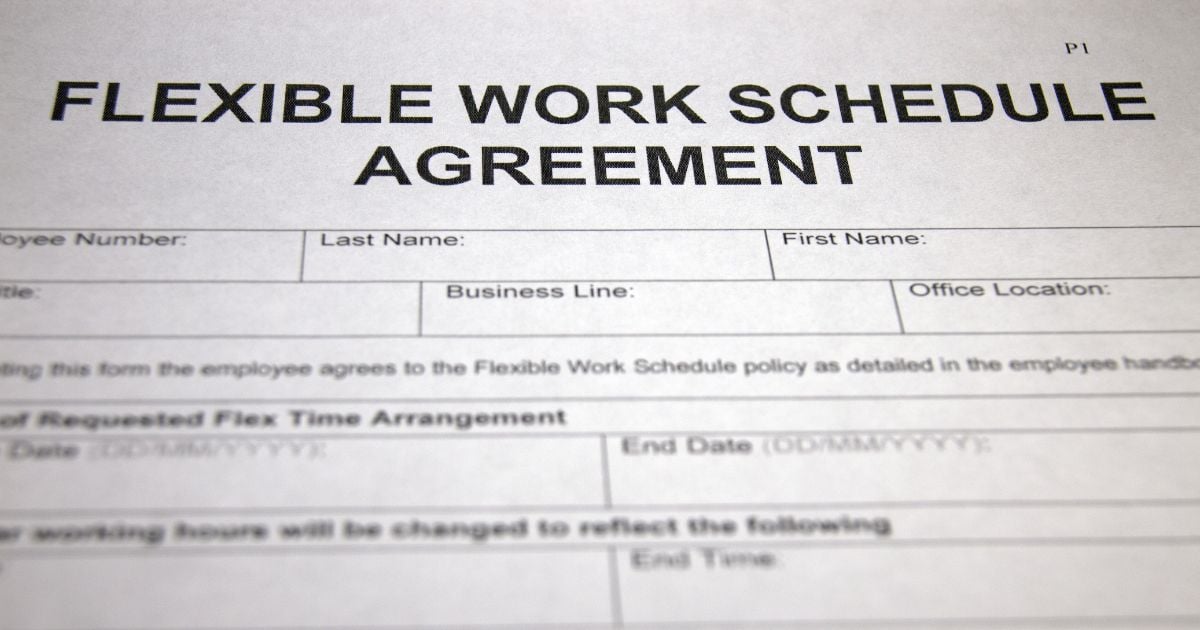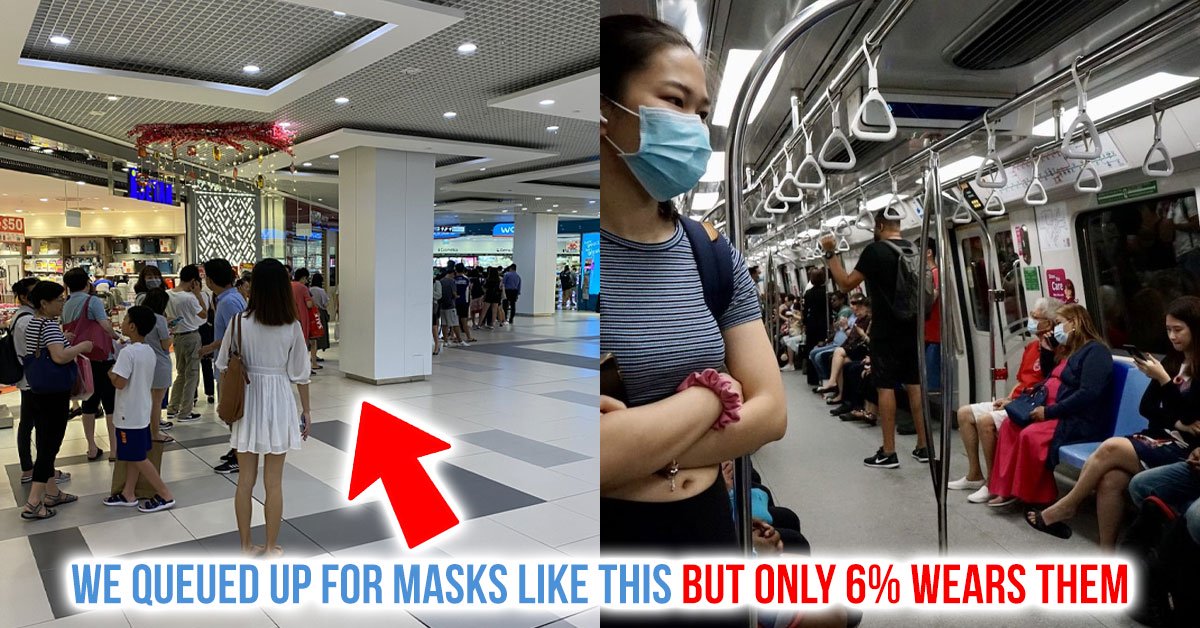No, Singapore does not have Unhappy Leave like Pang Dong Lai. You can’t skip work just because you don’t feel like it.
But, there is something we can look forward to this year: flexible working arrangements (FWA).
You can watch this video to know what flexible working arrangements are:
Reader: Omg, it’s finally happening. The 4-day work week I’ve been dreaming of is finally guaranteed.
Uh… actually, not quite guaranteed.
You can still try to ask for it, but be reasonable lah.
Reader: Say less.
Flexi-Work Request Must Be Fairly Considered
From 1 December 2024, all employers in Singapore must fairly consider formal requests from employees for FWA under the new Tripartite Guidelines on Flexible Work Arrangements Request.
Formal requests often take the form of structured, recurring arrangements that entail some changes in work processes.
Non-formal requests for FWAs, such as casual verbal requests, do not fall under these guidelines, but they should be allowed to be raised, and approved or rejected, so long as there is a consensus.
A tripartite workgroup has been working on these compulsory guidelines since September last year. The guidelines were unveiled on 15 April 2024 when the three co-chairs of the workgroup paid a visit to McDonald’s Ridout Tea Garden outlet.

The co-chairs are Minister of State for Manpower Gan Siow Huang; Singapore National Employers Federation honorary secretary Edwin Ng; and Ms Yeo Wan Ling, assistant secretary-general of the National Trades Union Congress (NTUC).
The rules will cover formal requests for FWAs, as well as the processes to submit and evaluate these. However, the guidelines will not govern the outcome.
So, if you request to work from home for the rest of your life, your company has to consider it, but they still have the right to say no.
The rules also adopt a broad definition of FWAs beyond flexi-place arrangements such as remote or hybrid working options.
Flexi-time and flexi-load arrangements such as staggered work hours, part-time work, or job sharing can be considered under these guidelines.
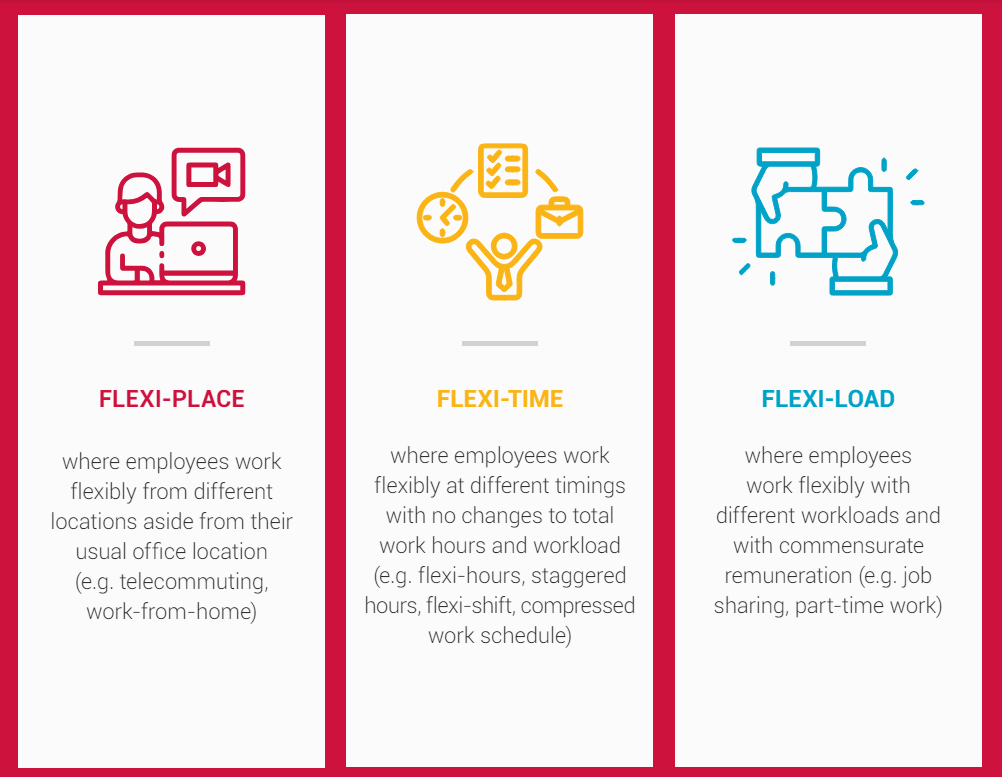
Want to avoid the morning rush hour commute? Suggest starting work an hour later everyday. You might have to end work an hour later, though.
Need to pick your child up from school? Suggest extending your lunch break by a little, in exchange for coming into work a little earlier.
If you want a 4-day work week, you can even suggest working late on four days of the week in exchange for one day off, but you might just KO after working late on so many days.
See what your boss says.
There are many options for you to play around with, so have a good think about it and figure out what works best for you and your schedule.
FWAs In Other Countries
Singapore is actually late to the game because other countries have already implemented this approach.
United Kingdom
In the United Kingdom, all employees have the legal right to request flexible working, such as a change to:
- the number of hours they work;
- when they start or finish work;
- the days they work; and
- where they work.
Employers there must deal with requests in a “reasonable manner” by:
- assessing the advantages and disadvantages of the application;
- discussing possible alternatives to the request; and/or
- offering an appeal process.
Employees in the UK can take employers who do not handle a FWA request in a reasonable manner to an employment tribunal.
Australia
In Australia, even part-time employees can request FWA. However, they must fulfill certain conditions such as working with the same employer for 12 months.
Pregnant women, the disabled, and the elderly are some examples of employees who can request FWA such as changes to hours or locations of work.
Employers there who get a request for FWA are to respond in writing within 21 days, and the response has to include whether the request is approved or refused.
In Singapore, however, the timeline is a little longer.
How FWAs Will Work In Singapore
Employees – Formal FWA Request
Employees, who have completed their probation, can submit formal requests for FWAs.
While it is not a must, employers can consider extending FWA options to employees who are still on probation.
Employees should make their formal FWA requests in writing, and follow requirements that employers stipulate.
If their employers do not stipulate any requirements, the guidelines urge employees to mention the date of request, type of FWA, duration, reason, and the start and end dates in their formal request by default.
Here is a request template provided:
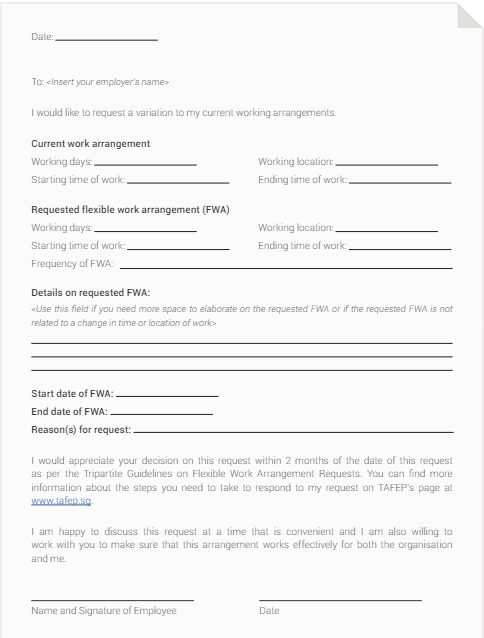
There are no constraints on the reasons that employees can provide for an FWA request.
Since these requests are not limited to caregiving responsibilities, maybe you can try your luck asking for Unhappy Leave or Unhappy Work From Home.
Whether your employer will grant that or not depends on them la horh.
Employers – Response
While employers in Australia are given a 21-day window to reply, those in Singapore are given two months, similar to the norm in the UK.
The two-month window is intended to give employers enough time to consider what alternative arrangements are needed should the request be approved, evaluate whether these arrangements are feasible, and then put them in place.
These could include checking how the workload and job hours of the requester’s colleagues may need to be changed.
Because your requests don’t just affect you, they affect your whole team.
Here is a response template provided:
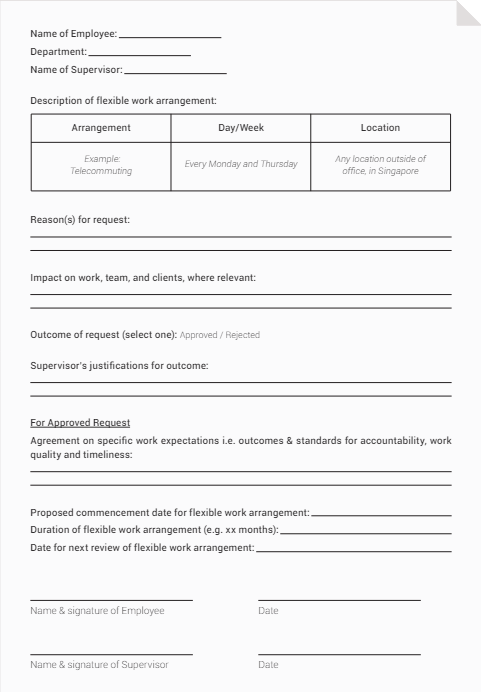
Of course, employers can’t just blindly grant requests.
“It must be the employers’ prerogative to decide if (an) FWA for a particular job is viable from a business point of view. That is a key principle that all tripartite partners subscribe to,” the workgroup said at a briefing on 4 April 2024.
While employers have the right to reject requests, they are encouraged to discuss alternative arrangements if the one sought is not feasible. The reason for the rejection must be given, and the workgroup said the reasons should generally be business-related, such as cost or feasibility.
Employers should not reject requests based on reasons not directly linked to business outcomes, like not believing in FWAs.
So your boss can’t say “I just don’t feel like it” or “because I said so”. They also can’t say they’re rejecting your FWA request because they don’t want other workers to request for the same thing.
Employees are strongly encouraged to discuss and resolve disagreements on requests with their employers via the company’s internal grievance-handling mechanism.
Employees in unions can also approach their unions for advice on FWA requests.
Employer Didn’t Adhere To Guidelines?
Employees whose employers did not adhere to the guidelines can approach the Tripartite Alliance for Fair and Progressive Employment Practices (TAFEP) for assistance on formal FWA requests.
The workgroup said TAFEP will contact the employers and advise them to comply with the guidelines.
Help For Employers
Don’t worry, employers. They’re not just going to introduce new guidelines and throw you into the ocean for you to figure it out yourself.
TAFEP and the Institute for Human Resource Professionals will be introducing training and resources next month to help employers gain the capabilities to implement FWAs effectively.
Employers can visit the TAFEP website to access these resources, sign up for training sessions, and make inquiries.
While December is usually referred to as the most wonderful time of the year because of Christmas, it seems Singaporeans will be celebrating in December due to different reasons.
Get your FWA draft ready for 1 December 2024, but be patient as there may be many people who want to submit their FWA requests on the first day too.
